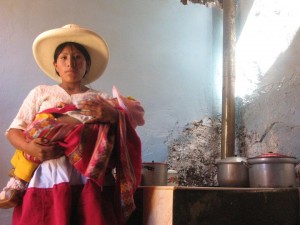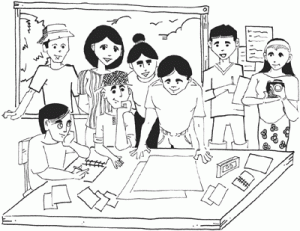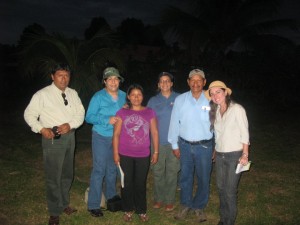My Passion: The Development Journalism*
I have returned to classes but bringing my background job experience on my shoulders. I am studying a master’s program in Madrid that, in some way, has made me rethink about my future and finally be more confident about my journalism vocation. This since each new teacher that I meet asks me "And what did you do before coming to Spain?" Of course, my first answer is to say that I've been working as an economic journalist. But I still feel short in my words each time I have to clarify that I'm not specialize in writing about banking and stock exchange markets.
Then I have to breath deep and tell them that much of my work consisted in travelling all over the country and stay in Andean communities and Amazon tribes, asking people about their traditions and lifestyles. This gave me the opportunity to question about the problems that prevent rural populations leave poverty and the importance of financial and technical support that indigenous people can receive from the Government, NGO or enterprises. Because of my job, I realized Peru has a multiplicity of interacting cultural expressions, and urgent issues like poverty, social conflicts, child malnutrition and a very low education level in public schools don’t allow us to be highly competitive or become a first world country.
After telling all these stories, one of my favorite teachers confirmed that I used to practice something called “Development Journalism”. To track my progress, another professor specialized in Climate Change commented that I put lots of passion when media topics arrive in classes. “You seem to have a great level of knowledge about this subject and committed to present relevant information about media and press issues, which adds credibility to your dissertations”, added.
It may sound idealistic, but I still think that journalism is a very strong tool that helps citizens to achieve political and economic development of their country. Seriously, a good journalism encourage readers to get deeply aware about their human rights and how to be involve in hacking corruption, gender discrimination, political abuses and all kinds of social illness.

Nevertheless, I really get stuck and frustrated when I see that some journalists in my country and all around the world do not seem to share the same values. Nowadays, with the emerging of blogs and social networks (like Facebook or Twitter) everyone can be a journalist (just have to start publishing). With this scenario, something contradictory seems to happen: many times people find that the most relevant news and opinions can be found in social networks, while in the daily and printing newspapers they could only get gossips and great trivialization of the news. This is the only alternative of some journalists to catch attention of “confused readers”?
During my days of university I learned that the role of media companies is to inform, entertain and educate. But what happens when, in the exercise of the profession, I see colleagues who only exaggerate the news they write in order to attract audience? So little strength left for myself to believe that a journalist can help to find solutions for the big real problems of any territory.
So my profession is on a real risk? Something in my mind tells me not. With all the available information found in social networks, some journalists can decide to go against the river and guarantee citizenships good and transparent information, instead of been caught by sensationalism. So I really have to convince myself that today there are great opportunities for journalists who are committed to write about development topics. As one of my teachers said in a brilliant conference, “the most important challenge for these journalists is to convince editors that news about environment and other sustainability issues can be (if journalists effort themselves) more powerful, convincing and attractive than gossips news”.

Of course, the choice for this kind of journalism is to appeal to creativity, viralization and use as many communications tools as possible, as well as leading social mobilization, lead environmental communications campaigns, and so on.
Taking into account the ideas mentioned above, I would like to refer to an interesting article from The Guardian named “What is development journalism?”[1]. In the report Sue George, the author, asks to readers: “Development Journalism is more than investigative journalism in a poor country?” The answer is no. In fact, Liz Ford, editor of the Katine website (site for The Guardian’s Ugandan Development Project) ensures that “Development Journalism means getting behind the “cliches” of starving children telling their own stories”.
So if I want to still straight on my purpose, I better start to shut down the idea that Development Journalism is treating people like victims or sensationalizing their lives. “This usually comes through perceiving them as less important, intelligent or significant than others. (…) Development Journalism asks questions to ordinary people, not just of officials. So it doesn’t patronize, but asks the reader to put themselves in the place of people whose lives seem very different from theirs”, says the author. Indeed, her ideas are brilliant.

Personally, I think that the idea of engagement has also a lot to do with this subject. Like my teachers propose “engagement is the inclusive term to describe the broad range of interactions between people through a variety of approaches”. So for me, journalism also means getting involve with people and asking them how they think or how they feel. If any journalist wants to get good information, he better starts to take dinner with their interviewees and observe their costumes and reactions in different approaches, before asking them all kinds of questions. That’s how it begins the process of getting engage with different people.
Indeed, as I studied during my bachelor, everything is relative and there is no pure objectivity when you tell a story or get conclusions of different people. The meanings are never absolute. But at least, with engagement and participatory approaches, the communicator could get a more clarify vision of the reality of another culture.
I am happy to find journalists who are committed to Development Journalism, like I also want for my future. Despite all the challenges and obstacles I can find on the road, that’s my purpose. The reason is simple like I read in the mentioned article: “Development Journalism gives soul to media, it gives it a human face.”
[1] http://www.guardian.co.uk/journalismcompetition/professional-what-is-development-journalism
*Artículo previamente publicado para un curso de mi maestria. De allí el cambio de idioma, con las disculpas del caso.



